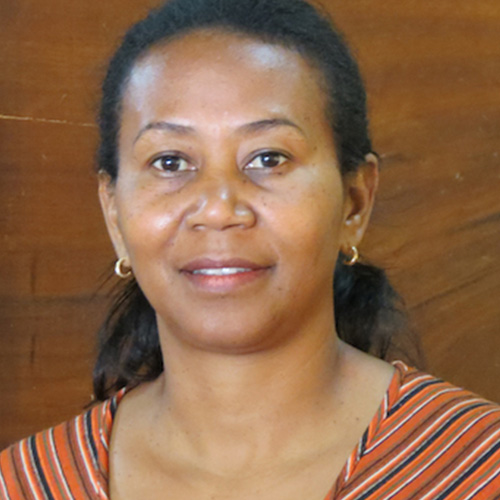
Soanandrasana Rahelinirina
Country (Nationality)
Madagascar
Grantee Title
Project: Fertility control experiment on rat in Madagascar: Laboratory and Field evaluations
Grantee Description
Soanandrasana Rahelinirina is a research scientist at the Institut Pasteur de Madagascar conducting work on the surveillance and risk of zoonotic diseases, particularly those with small mammal reservoirs. She has worked as a mammalogist since 2009. She has been a principal investigator in several studies in rodent control in plague foci and surveillance of leptospirosis in rodent and livestock. The Institut Pasteur de Madagascar is an establishment of the Pasteur Institute under supervision of the Malagasy Ministry of Public Health. The four main objectives of IPM are: research activities directly applied to national health priorities; public health activities by its WHO Reference Centers; training and education essential in the Malagasy context, and service activities. Rahelinirina will visit the Africa Centre of Excellence for Innovative Rodent Pest Management and Biosensor Technology Development in Tanzania. It is the only Centre in Africa dealing with research on rodents (zoonosis, ecologically based rodent management).
Project: Fertility control experiment on rat in Madagascar: Laboratory and Field evaluations
Madagascar is the country most affected by plague. Bubonic plague transmitted by infected fleas living on rodent is the most clinical form in Madagascar. New approaches to prevent plague outbreaks are required in endemic foci areas. Currently, the available method for rodent control is the use of live traps to capture rodent. Killing rodent without using insecticide is not recommended in order to limit the risk of fleas leaving dead rodents in search of new hosts. Additional methods that could interfere with plague transmission are more than necessary to reduce the population of rats.
Fertility control is considered as a non-lethal, humane and sustainable method for managing rodent populations. Fertility control has already been tested in China and has been argued to be more humane. The Africa Centre of Excellence for Innovative Rodent Pest Management based at Sokoine University of Agriculture in Tanzania is involved in pioneering research on ecologically-based rodent pest management and innovative technologies for pest management in Africa. The centre has developed fertility bait containing two synthetic fertility hormones for management of field rats. The aim of this project is to evaluate the potential of synthetic fertility control hormones on reproduction and population reduction of black rats, Rattus rattus, to prevent bubonic plague outbreaks in humans in Madagascar.
Rahelinirina will benefit immensely from the training during 120 days at the ACE IRPM &BTD to enable her to conduct pioneering studies in Madagascar on the use of synthetic fertility hormones to control of the black rats, the major reservoir of plague in Madagascar. The purposes of the attachment are to train (1) in the preparation of bait with fertility hormones for rodent pest management (2) in histological techniques to determine the effect of fertility hormones on rodent reproductive organs (3) in techniques for sperm morphology analysis and effect of fertility hormones on sperm viability and counts (4) in techniques and protocols for laboratory experiments and field trials for establishing the effect of fertility hormones on reproduction and population dynamics of rodents.
